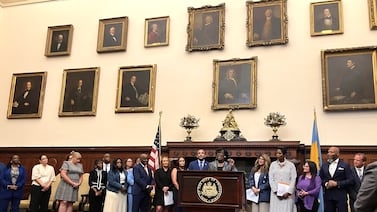Sign up for our free monthly newsletter Beyond High School to get the latest news about college and career paths for Colorado’s high school grads.
Many Colorado high school graduates have headed into this summer uncertain about college.
Some still might need an estimate of the cost, commit to enroll at a school, or finish tasks, like turning in immunization records and high school transcripts, before they show up in the fall.
While students and families might fear they’re behind for the fall, college advisers and admissions experts say they shouldn’t worry after a college-going process complicated by Free Application for Federal Student Aid issues.
“It’s been a bit of a struggle,” said Federico Rangel, a Denver Scholarship Foundation college adviser. “And it’s been hard for students to make college decisions.”
Because of the FAFSA complications, college experts worry students’ dreams of college might fade during the summer. But, they say, there are ways students and families can stay on top of the process.
Here are five tips to remain on track this summer.
If you haven’t, fill out the FAFSA
Nationally, less than half of the Class of 2024 has filled out the FAFSA, which opens the possibility of federal grants and institutional aid to attend college. About 11% fewer students have filled out the FAFSA compared to last year.
This year’s FAFSA issues started with a delay in when students could fill out the form. Problems persisted throughout much of the year. But, most problems that prevented students from filling out the form have been resolved.
Filling out the FAFSA is critical to families so they understand how much they can expect to pay.
Colleges and universities use the FAFSA to determine financial aid for each family. Many students who struggle the most to pay for college qualify to pay a lot less or even nothing.
Most students who are not U.S. citizens or permanent residents cannot fill out the FAFSA, but students who graduate from Colorado high schools can fill out the CASFA, or the Colorado Application for State Financial Aid. Students then can qualify for in-state tuition and aid, regardless of their immigration status.
You’re not too late to enroll in college
Haven’t committed to a college or university yet? That’s OK.
Many colleges nationwide extended enrollment deadlines to June 1. But, just because the deadline has passed doesn’t mean students are too late to choose a school.
Larger flagship schools like the University of Colorado Boulder might be more strict on the timing of enrollment, but Marty Somero, director of University of Northern Colorado’s financial aid office, said he speaks with other admissions officers frequently and every public college and university will still work with students.
Smaller, regional universities like UNC in Greeley are more flexible. Although the schools may have stated enrollment deadlines, Somero said, “we really don’t.”
“We just want to encourage students to make a decision as soon as possible,” he said.
Community colleges have the most flexible enrollment deadlines.
“Colorado public colleges and universities are glad to work with students if they need to take just a little bit longer to make some decisions,” Somero said.
Make a list of college to-do items
Once a student commits to a college, there’s still a lot to do. Students must sign up for orientation, submit immunization records and high school transcripts, and check on housing options if they want to live on campus.
Students should keep a checklist of tasks they must complete.
“Students will need to keep things moving in the right direction so they don’t fall behind,” Somero said.
Rangel said typically he helps students prepare for college in April. But that timeline has been delayed for many students this year because they’re still waiting on financial aid details.
For example, Adams State University’s financial aid office is holding open hours on Fridays to help any student or parent fill out the FAFSA or figure out the college-going process.
The university also plans to hold Friday and Saturday webinars throughout the summer.Students and parents can call 719-587-7306 or email onestop@adams.edu for help. To access the webinar link visit adams.edu and click on the FAFSA Fridays graphic.
Don’t hesitate to reach out
Have a question?
Rangel and Somero said college advisers and admission officers want to help.
“Students certainly should reach out to the schools,” Somero said.
Students also can keep in touch with their high school counselors. Rangel said he will be helping Denver students throughout the summer with questions and completing items necessary to go to college. Other school counselors are available to do the same, he said.Somero also said college admissions officers want to help. A call to the school’s admissions office can help students and families stay on track, he said.
“There’s help out there,” Somero said.
Connect with a school resource office
There are other offices at colleges and universities that can help. Rangel said a great way to get questions answered is to reach out to student resource centers on campuses.
The support services, sometimes called educational opportunity centers or academic success offices, are meant to help students on campus.
Students also can sign up for programs meant to help them succeed. Programs like TRIO, which includes three federal programs meant to help students from low-income backgrounds and who are the first in their families to go to college, can help students navigate hurdles throughout the summer. The programs — Upward Bound, Talent Search, and Student Support Services — also help students once they are enrolled and taking classes.
Jason Gonzales is a reporter covering higher education and the Colorado legislature. Chalkbeat Colorado partners with Open Campus on higher education coverage. Contact Jason at jgonzales@chalkbeat.org.







